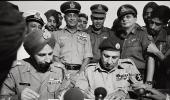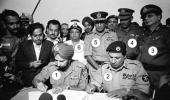'The 1971 War was our greatest military victory.'
'It had so many stories of exceptional valour and leadership.'
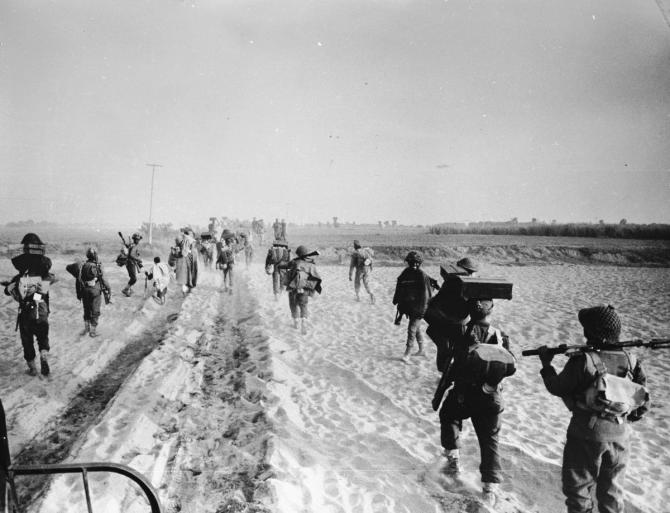
"We ate uncooked rice mixed duck eggs; and slept in haystacks in the rice fields. When the enemy came to know that we were using haystacks to sleep, they started firing phosphorous shells. These shells burst into flames, but we still managed to survive."
Colonel Gurbachan Singh Cheema (retired) was among the extraordinary generation of warriors who fought in the 1971 War with Pakistan.
These officers and men won a spectacular victory in a brilliantly fought military campaign that resulted in the breakup of Pakistan's eastern flank and the creation of independent Bangladesh.
Among the first soldiers to undergo a commando course in 1964, Colonel Cheema hails from a family of military men who have served the Indian Army. He fought the 1965 war with Pakistan in Tithwal in the Tangdhar sector of Jammu and Kashmir.
In the 1971 War, he was battery commander of 10 Bihar.
"I was among the officers and troops from 10 Bihar and 4 Guards that were dropped behind enemy lines. I landed in a rice field from a height of 30 feet.
"We surrounded the enemy from the rear. Pakistani troops were running towards us and we captured them," Colonel Cheema tells Rediff.com's Archana Masih reliving those days of war and that year, this day when he saw Pakistan surrender at the race course in Dhaka.
Much before war broke out in December 1971, I was posted as an intelligence officer to in Agartala, Tripura.
The runway at Agartala airport touched the border of then East Pakistan (present Bangladesh).
I reached Agartala in March 1971; the very next day I was deployed in a bunker on the border. The situation was tense.
Sheikh Mujibur Rahman's Awami League party had won the election, but the military rulers did not let him form the government. Mujibur Rahman declared East Pakistan as an independent country in March which resulted in his imprisonment and wide-scale torture of Bengalis by the Pakistan army.
The Bengalis started pouring into India in thousands to escape the genocide.
Our task was to assist the Mukti Bahini (resistance army comprising military and civilians of East Pakistan). We used to help them capture some Pakistani posts by laying ambush, taking over and handing them over to the Mukti Bahini.
This was our routine.
Instead of wearing a uniform, we wore lungis and chappals to merge with the Mukti Bahini fighters. I used to carry binoculars and map around my neck. I would come across Pakistani soldiers on the other side who spoke Punjabi like I did.
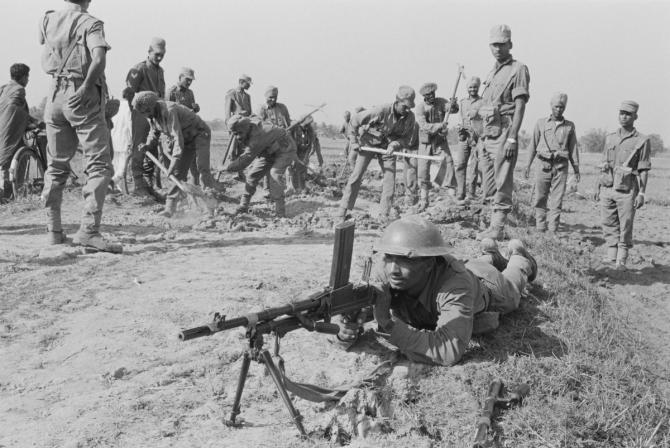
I was battery commander of 10 Bihar battalion. On November 29, 1971, we entered East Pakistan with the plan to capture Akhaura which was the biggest rail junction of East Pakistan.
The fight was very tough because the Pakistan army had constructed cemented bunkers and were supported by tank and gun support. Our plan was to capture Akhaura and hand it over to the Mukti Bahini.
It took five days to capture Akhaura, December 3. We lost officers and men in the battle.
In the meantime while we were in East Pakistan Prime Minsiter Indira Gandhi declared war on December 3.
As a result we wore the same uniform from November 29 up to December 17 -- we were unwashed; with no clothing and no rations!
We ate raw rice and duck eggs; we would break the eggs into a glass and mix it with raw rice. At night we hid and slept in haystacks in the rice fields. When the enemy came to know that we were using haystacks to sleep, they started firing phosphorous shells. These shells burst into flames, but we still managed to survive.
I lost a fellow officer in a shell burst. He was standing a few yards away.
I sustained a pellet injury in my ankle. The doctor said I would have to go hospital or else it could become gangrenous, but I refused. I did not want to dishonour my men, my battalion and my warrior clan by leaving the battlefield and going to the hospital. By the grace of God and my determination, I1 recovered in a few days.
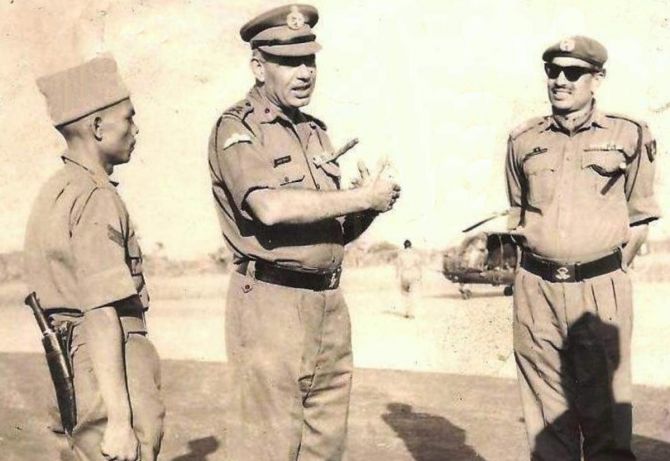
Our advance was halted by the mighty Meghna river and we were stuck.
Lieutenant General Sagat Singh, the brave and daring corps commander made the plan to drop troops in an airlift operation behind enemy lines.
Group Captain Chandan Singh was in charge of the helicopter operation to airlift troops in order to overcome the obstacles on the ground.
I was among the officers and troops from 10 Bihar and 4 Guards that were dropped behind enemy lines. I landed in a rice field from a height of 30 feet.
We surrounded the enemy from the rear. Pakistani troops were running towards us and we captured them.
Since there was no transport, we marched towards Dhaka. In fact, from November 29 onwards, we were on foot. When we reached the outskirts of Dhaka, we crossed the Lakya river in small boats. We fought a minor battle while crossing the river.
On entering Dhaka, the two battalions of 10 Bihar and 4 Guards surrounded an enemy regiment.
We entered Dhaka on the morning of 16th December at 9 am.
The Pakistan army surrendered on December 16.
I remember entering the Intercontinental Hotel [declared a neutral zone by the International Red Cross] in a torn uniform. I tucked my shirt in the front to hide the torn part and left it untucked from behind to hide my torn trousers! (I later went to my regiment, the 65 Mountain Regiment which was staying at Dhaka university and got a change of clothes.)
We found the governor of East Pakistan A M Malik having breakfast at the Intercontinental Hotel. 'Can we join you?' we asked. He was astonished to see us. I picked up a toothpick from his table as a souvenir which I later presented as memorabilia to our mess.
That evening, I was present at the surrender ceremony at the Race Course in Dhaka.
I stayed in the Intercontinental Hotel for one-and-half days. I later even stayed at the Eastern Command mess in the room Lieutenant General A A K Niazi [commander of the Pakistan army in East Pakistan] had stayed.
I found a brass goblet with 'AAK Niazi' engraved on it. I brought it as a souvenir and presented it to the army mess on the golden jubilee of the capture of Dhaka.
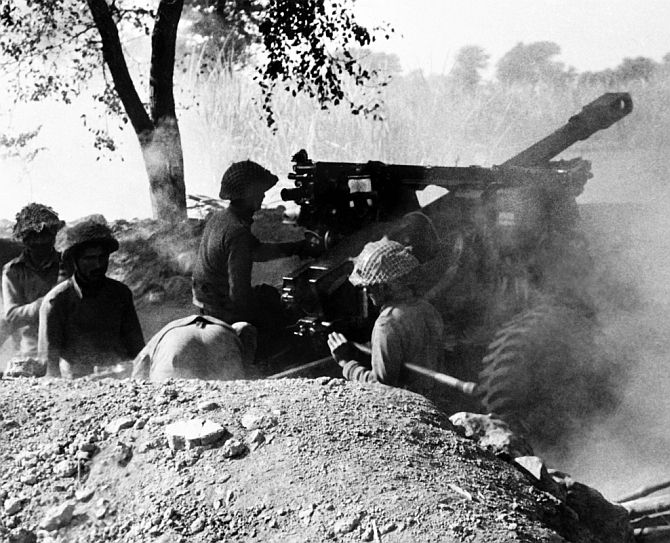
After the surrender, I was in charge of the security of nine important buildings in Dhaka which included the stadium, State Bank Pakistan, railway station, airport, and telephone exchange.
Even though 93,000 Pakistani prisoners of war surrendered, there were some elements in East Pakistan who did not. They killed Major General G S Nagra's ADC.
We were not completely safe and we travelled with guard vehicles. After 5-6 days, the Bengalis who had fled Dhaka started returning. They gave us a lot of respect. The locals help us a lot in the capture of Dhaka. They carried our guns, ammunition, gave us vehicles.
I stayed till in Dhaka till May 1972. Since I was in charge of the airport, I was there to receive Sheikh Mujibur Rahman on his return. In fact, his personal home had served as our officer's mess.
I bought a rug in Dhaka for Rs 240 which lasted nearly 25 years.
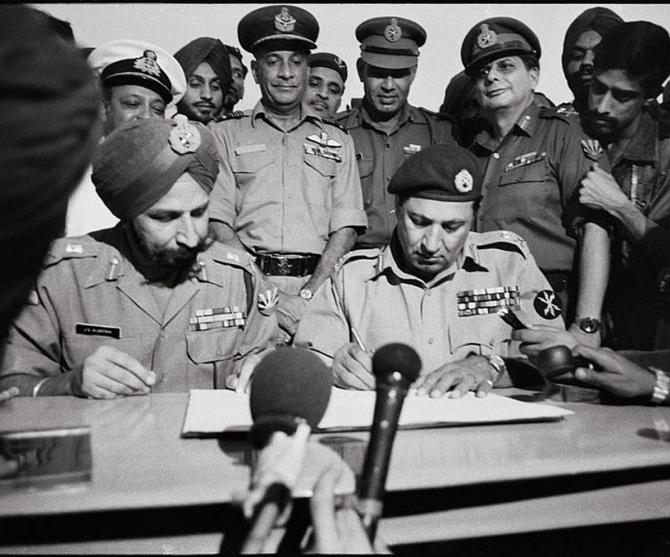
Among the Indian military officers present: Eastern Army Commander Lieutenant General Jagjit Singh Aurora, Major General J F R 'Jake' Jacob, Chief of Staff, Eastern Command, Lieutenant General Sagat Singh, General Officer Commanding 4 Corps and the general who 'liberated' Bangladesh, Air Marshal Hari Chand 'Harry' Dewan, Commander in Chief, Eastern Air Command, Vice Admiral Nilkanta Krishnan, Flag Officer Commanding-in-Chief, Eastern Naval Command. Photograph: DPR Photo Division Archives
I returned to Agartala on my return from Dhaka. We placed some of the captured Pakistani tanks on the crossroads of Agartala.
I was then posted to the Indian Military Training Team in Bhutan for a year. I remember the present king's grandfather would come to practise archery in our regimental area.
The 1971 War was our greatest military victory. It had so many stories of exceptional valour and leadership. I was fortunate to have fought that war.
Feature Presentation: Aslam Hunani/Rediff.com


